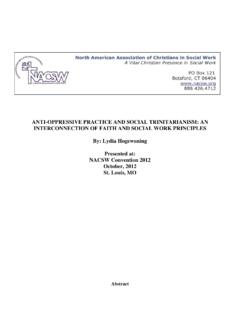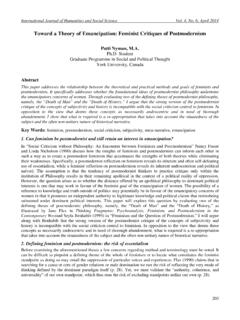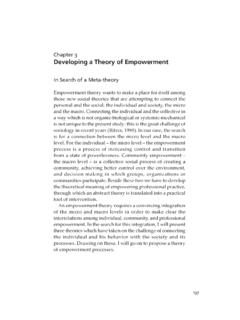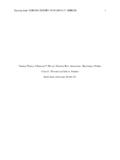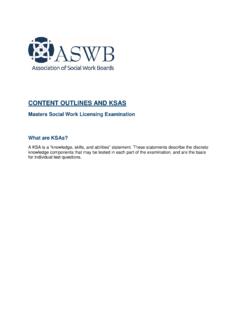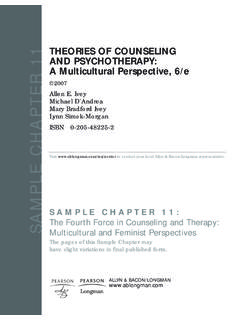Transcription of OVERVIEW OF THEORIES - Azusa Pacific University
1 Revised 8/2008 OVERVIEW OF THEORIES OF HUMAN BEHAVIOR & THE social ENVIRONMENT APPLICATIONS TO social work GENERALIST PRACTICE The following is a very general outline summarizing the THEORIES covered in the NCSSS foundation classes of SSS 571: Human Behavior & the social Environment. Theory application & integration with practice are demonstrated. This outline is only a summary of highlights; all theorists, ideas, and concepts are not included. Because human behavior is complex and the social work profession is broad, numerous THEORIES are utilized for social work practice at the micro-meso-macro levels.
2 These THEORIES focus on human growth and development, psychological and social functioning, and social service delivery. Some THEORIES emphasize social and economic justice. All THEORIES are value-laden and come out of a socio-historical context. Thus, all THEORIES should be critiqued with attention paid to their cross-cultural applicability. DEFINITIONS: Theory interrelated sets of concepts and propositions, organized into a deductive system to explain relationships about certain aspects of the world ( , the THEORIES listed below).
3 Perspective an emphasis or point of view; concepts at an earlier level of development ( , a strengths perspective ) or at a broader and higher level of abstraction (ex: a humanistic perspective or a developmental perspective ) Paradigm an archetype or mode of thought; a general way of seeing the world ( , modernism or post-modernism ) Practice Model a guide for practitioner interaction that operationalizes theory; includes concrete actions and techniques (note: some THEORIES have more well-developed practice models than others) Dimension a feature that can be focused on individually or separately, but can only be understood in relation to other features (as in dimensions of human behavior or a multi-dimensional approach to human behavior) [Sources: Hutchison, E.]
4 D. (2003). Dimensions of human behavior: Person and environment (2nd ed.). Thousand Oaks: Sage. Robbins, S., Chatterjee, P., & Canda, E. (Eds.) (2005). Contemporary human behavior theory: A critical perspective for social work (2nd ed.). Boston: Allyn and Bacon.] 2 THEORY OF HUMAN BEHAVIOR FOCUS OF THEORY MAIN CONCEPTS RE: HUMAN BEHAVIOR SOME THEORISTS SOME PRACTICE APPLICATIONS SOME PRACTICE INTERVENTIONS SYSTEMS THEORY Includes: Ecological Systems [Systems Perspective] Includes.
5 Family Systems [Systems Perspective] How persons interact with their environment How the family system affects the individual and family functioning across the life-span *Persons are in continual transaction with their environment *Systems are interrelated parts or subsystems constituting an ordered whole *Each subsystem impacts all other parts and whole system *Systems can have closed or open boundaries *Systems tend toward equilibrium *Individual functioning shapes family functioning and family systems can create pathology within
6 The individual *Boundaries, roles, communication, family structure influence family functioning Parsons Merton Germain Gitterman Bowen Satir Minuchin Carter & McGoldrick *Useful for developing holistic view of persons-in-environment *Enhances understanding of interactions between micro-meso-macro levels of organization *Enriches contextual understanding of behavior *Useful for understanding family systems and life cycles over multiple generations *Strengthen one part of the system or subsystem to impact the whole system *Ecomaps &
7 Genograms for understanding system dynamics *Networking & referrals to facilitate change *Assessment of family development and life-cycle transitions *Use of multi-generational genograms *Use of family and parent coaching BEHAVIORISM & social LEARNING THEORY Includes: Cognitive theory, Behavioral theory, social Learning theory [ social Behavioral Perspective] How individuals develop cognitive functioning and learn through acting on their environment *Imitation & reaction to stimulation shape behavioral learning *Knowledge is constructed through children physically and mentally acting on objects *Intelligence is an evolutionary.
8 Biological adaptation to environment *Cognitive structures enable adaptation & organization Pavlov Skinner Watson Piaget Bandura Beck *Useful for enabling behavioral & symptomatic change *Useful for assessing individual cognitive functioning, group & family interactions *Behavioral interventions such as classical or operant conditioning, positive or negative reinforcement *Time-limited, problem-focused interventions *Cognitive reframing of automatic thoughts about presenting problems to facilitate change 3 THEORY OF HUMAN BEHAVIOR FOCUS OF THEORY MAIN CONCEPTS RE: HUMAN BEHAVIOR SOME THEORISTS SOME PRACTICE APPLICATIONS SOME PRACTICE INTERVENTIONS PSYCHODYNAMIC THEORY Includes.
9 Classical psycho-dynamic theory, Ego-psychology, Object-relations theory, Self-psychology [Psychodynamic Perspective] How inner energies and external forces interact to impact emotional development *Unconscious and conscious mental activity motivate human behavior *Ego functions mediate between individual and environment *Ego defense mechanisms protect individuals from becoming overwhelmed by unacceptable impulses and threats *Internalized experiences shape personality development and functioning *Healing occurs through attention to transferences and the treatment relationship S.
10 Freud Adler Jung Horney A. Freud Kernberg Kohut Klein Mahler Bowlby *Useful for understanding inner meanings & intrapsychic processes *Useful for understanding motivation, adaptation, & interpersonal relationships *Useful for assessing strengths & ego functioning Ego supportive treatment: *Clarification, education, & support of adaptive functioning *Empathy & attention to affects and emotions *Understanding of ego defense mechanisms & underscoring of ego strengths *Establishing, building, & using the treatment relationship to facilitate change PSYCHOSOCIAL DEVELOPMENTAL THEORY [Developmental Perspective]

